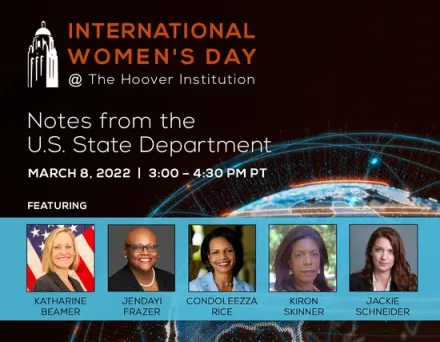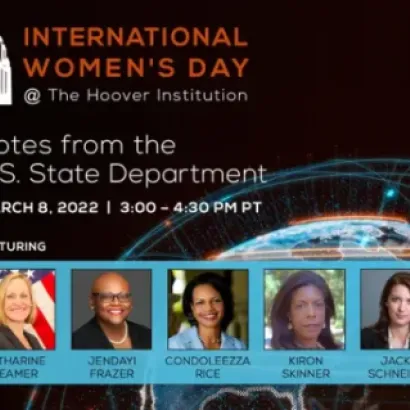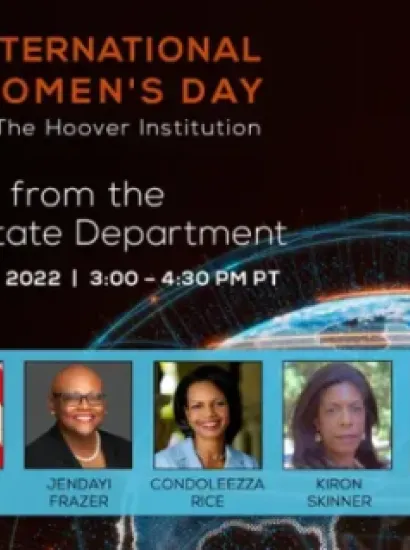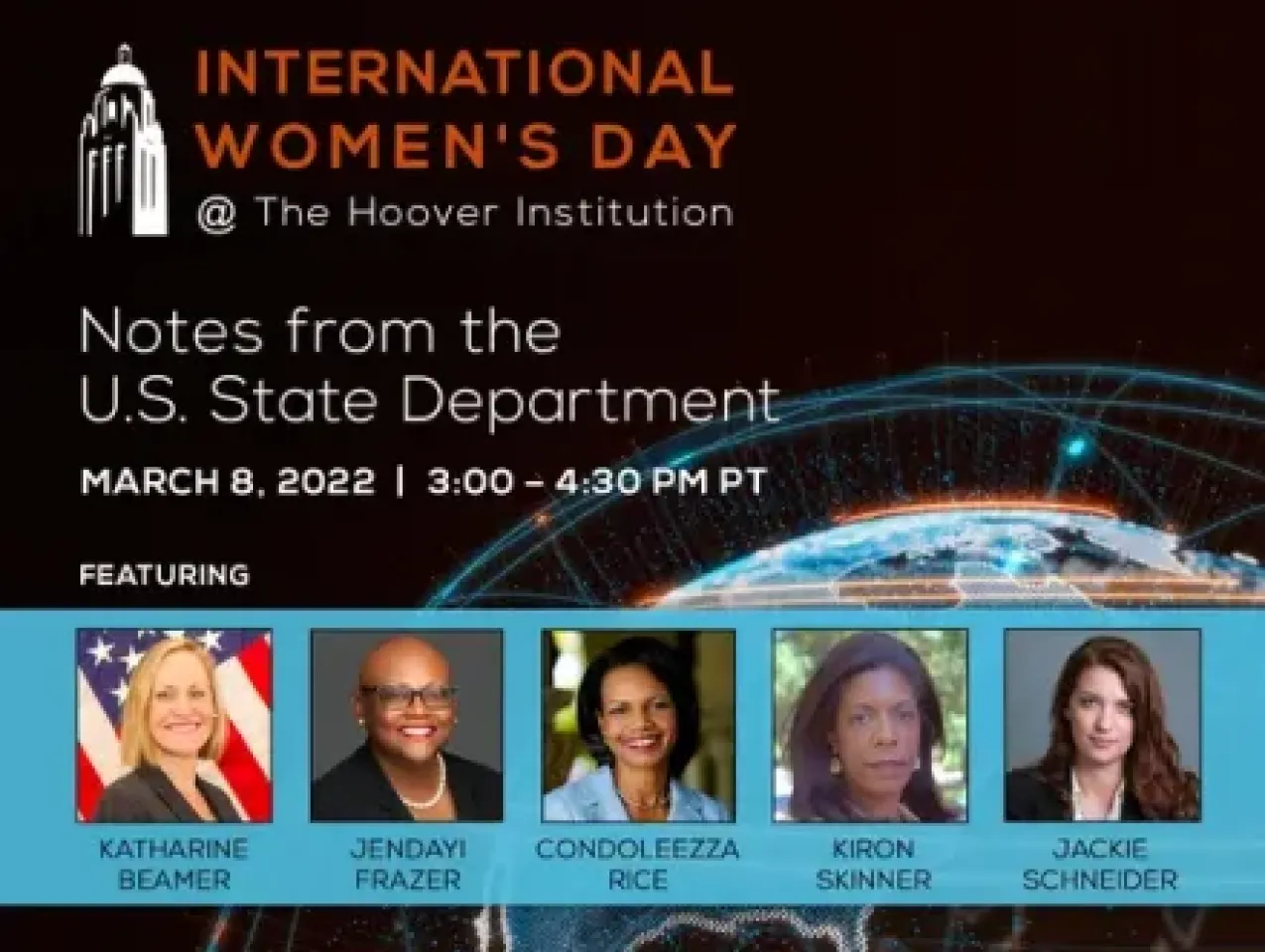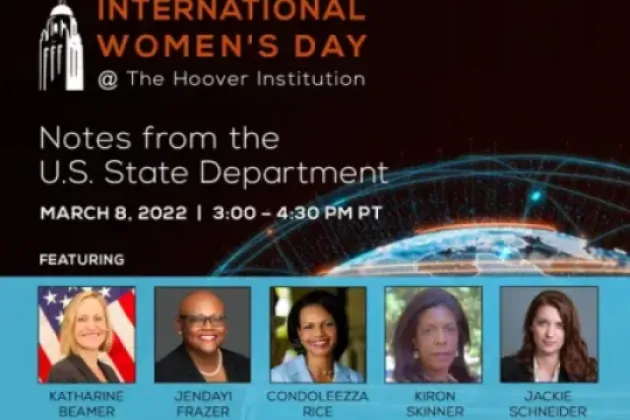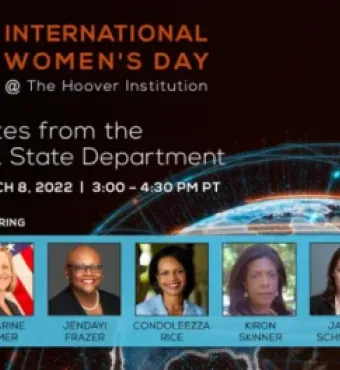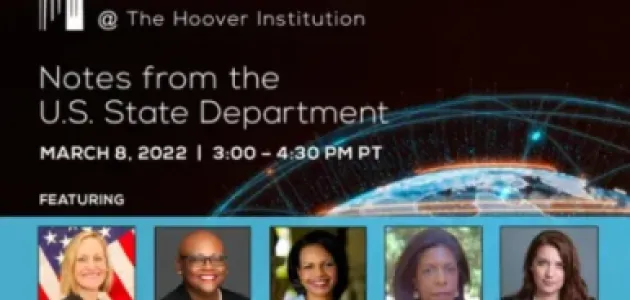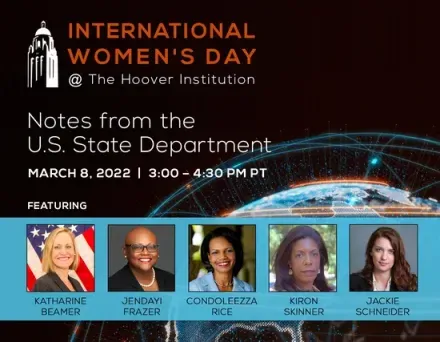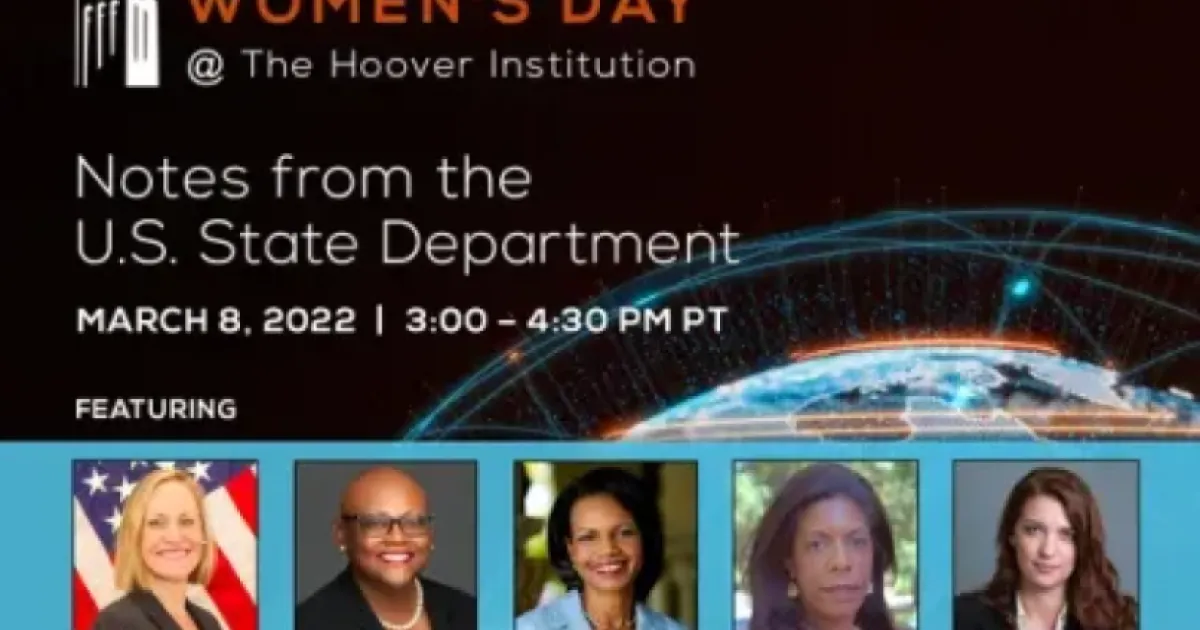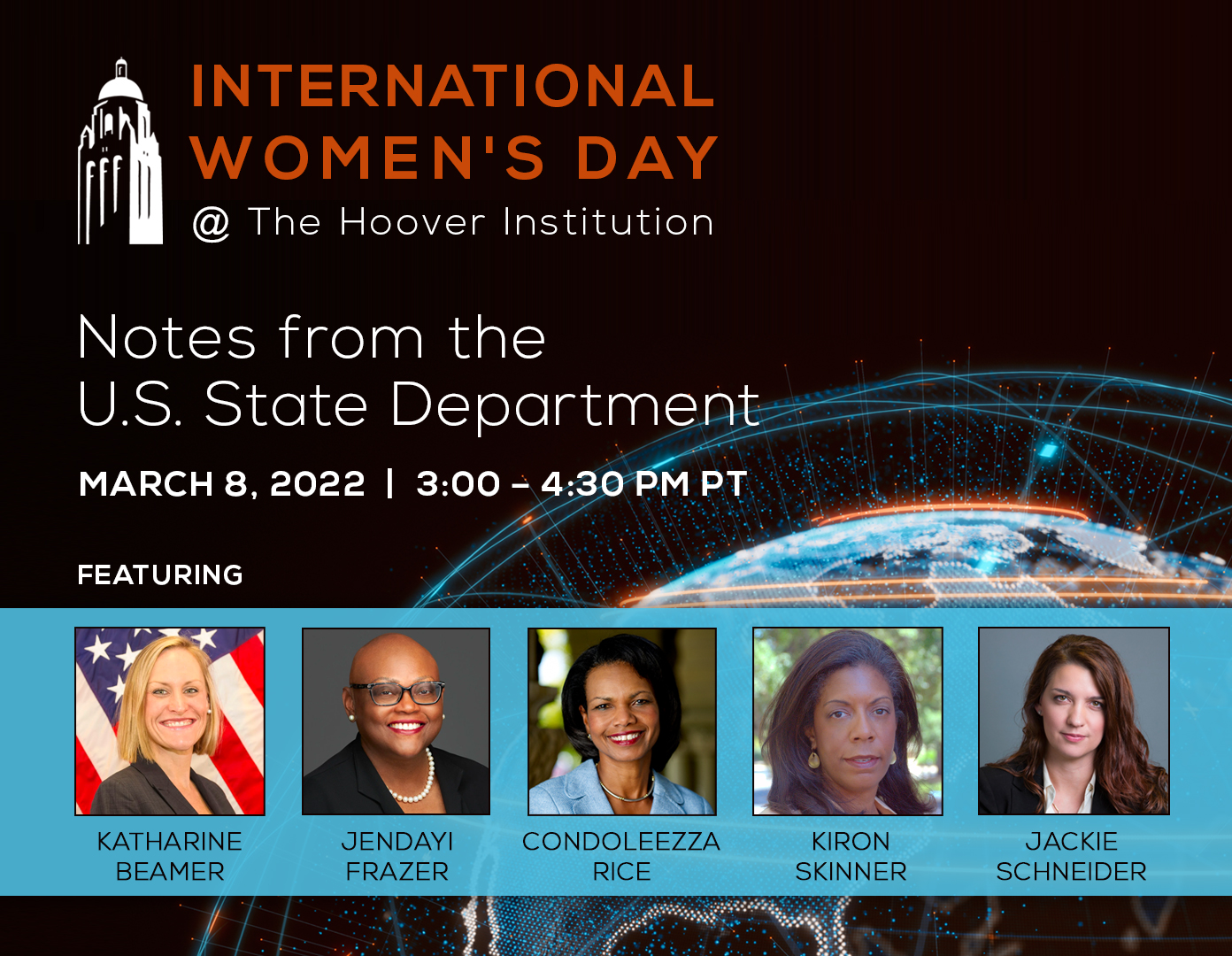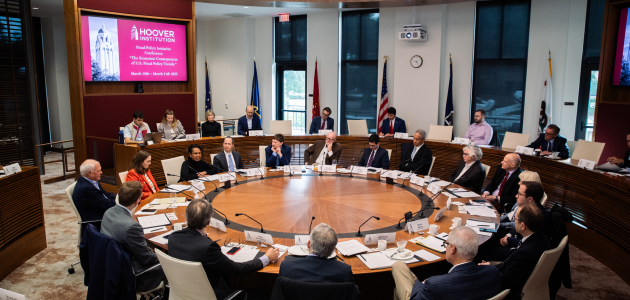Four Hoover fellows, all of whom have served with distinction as US diplomats, described their roles in protecting American interests and advancing global security and stability, during a virtual program on International Women’s Day.
The four women, Condoleezza Rice, Kiron Skinner, Jendayi Frazer, and Katharine Beamer, represent a diverse set of professional backgrounds and academic disciplines, and each has served a unique role in the US Department of State.
How They Got There
Beamer, a National Security Affairs Fellow for the current academic year, is a political officer in the US Foreign Service, serving the bulk of her career in Latin America—in US embassies in Bolivia, Guatemala, and the Dominican Republic. These periods of service were invariably interrupted by assignments elsewhere in the world, including in Poland, in Slovakia, and in a fellowship on US Capitol Hill, where she helped author the Global Magnitsky Act.
Jendayi Frazer, a Stanford-educated political scientist, professor at Carnegie Mellon University, and internationally respected expert on the African continent, was hired by her mentor and dissertation advisor Condoleezza Rice, as senior director for Africa on the National Security Council. Three years into that job, Frazer was selected by then secretary of state Colin Powell as US ambassador to South Africa. When Condoleezza Rice became secretary of state, she appointed Frazer to assistant secretary of state for African affairs. During her tenure in that post, Frazer oversaw the formulation of US policy on the continent and helped forge a peace settlement in Kenya, after that country descended into violence following a disputed election in 2008.
A pupil of Rice when she was teaching at Harvard, Kiron Skinner has enjoyed a successful academic career at Carnegie Mellon University. She assisted George P. Shultz in the research and writing of Turmoil and Triumph, his memoir of his years as secretary of state. She also served on several boards and committees at the US Department of Defense, before being called back to public service by President Donald Trump, first as a presidential campaign advisor and then as State Department director of policy planning.
Prior to becoming the first African American woman to serve as secretary of state, Condoleezza Rice spent the majority of her career in academia at Stanford University and on the National Security Council, first as senior director of Soviet affairs during the administration of President George H. W. Bush from 1989 to 1991, and then as national security advisor to President George W. Bush from 2001 to 2005. However, Rice noted that her first job out of college was as an intern at the State Department’s Bureau for Educational and Cultural affairs during the administration of President Jimmy Carter.
How Diplomacy Works During a Crisis
The global response to crises, such as the one currently unfolding in Ukraine, is a prime example of US diplomacy in action, explained Beamer.
There are currently foreign service officers serving in bordering Poland and Slovakia and other places in Eastern Europe who are assisting in the evacuation of US citizens, as well as coordinating with governments and international organizations in relief efforts to the more than three million Ukraine refugees fleeing their war-torn country. Diplomats are providing senior US officials with the latest information they receive from their in-the-field reporting. They are also working with counterparts throughout Europe to impose appropriate and effective sanctions on Russia because of the Kremlin’s decision to invade Ukraine.
Beamer argued that none of the current efforts could be sustained without relationships American diplomats have made with Eastern European government leaders, business professionals, nongovernmental officials, and just ordinary citizens, some of which have endured for several years.
“When the crisis hits, we know who to call and who can help us,” Beamer said.
Similarly, Frazer described the consequential role of American diplomacy in the Kenya election crisis of 2008. She said that formulating clear policies required coordination with then secretary Rice and between US government agencies. In their execution, Frazer was thrust into negotiations with conflicting parties as well as consultations with neighboring countries, including Uganda and Tanzania, who were also impacted by the crisis.
“It’s amazing how much influence and power the United States has in these crises,” said Frazer. “People look to the United States to be the provider of a solution.”
However, Skinner added that some reforms and reorganization should be considered within the State Department. She argued that the current structure—composed of disparate regional and functional bureaus, and a layer of special envoys hyper-focused on specific crises—doesn’t allow the organization to achieve a clear strategic picture on how American leadership can solve long-term challenges and work to benefit the national interest.
“It is hard bureaucratically to even think along those lines,” Skinner said.
Assessing the Russia-Ukraine Crisis
Rice asserted that President Vladimir Putin made the decision to invade Ukraine because he felt threatened that the nations surrounding Russia, which were once Soviet states and Warsaw Pact countries, have become more oriented toward Western democratic values since the collapse of the USSR. Moreover, Putin has exhibited increasingly hubristic behavior and persuaded himself of the delusional view that Ukrainians and Russians are one and the same people.
“He’s not the same Vladimir Putin I once knew,” said Rice. “He’s unnervingly aggressive. He’s not calculating. He’s erratic.”
Rice believes that prior to launching the invasion, Putin had overestimated the capabilities of Russia’s armed forces and underestimated the resolve of the Ukrainian people and the unified response of the international community. Nevertheless, Putin should have been wiser to understand how difficult it would be to bring 43 million Ukrainians under Russia’s sphere of influence.
Putin may too have failed to expect the exorbitantly high cost of Western-imposed sanctions and the isolation of Russia’s people from the global economic system. Russian per capita GDP has grown substantially since the end of Soviet rule, and its people have become accustomed to enjoying greater freedom and prosperity.
“Now because of the actions of this one megalomaniacal man, they are being cut off and sacrificed,” Rice lamented. “I hope we can find a way to keep lines of communication open to the Russian people.”
Unique Qualities of Women Leaders
When asked by the moderator of the program, Hoover Fellow Jackie Schneider, about the unique qualities of women leaders, Rice responded that they tended to be attentive listeners. As secretary of state, Rice explained, she often let others speak first in meetings.
“That was to both open the conversation so people wouldn’t feel constrained about what I said . . . but also so that I could listen to what the mood was in the room,” Rice recalled. “I could listen to what I was hearing from adversaries as well as friends. I could hear what the nature of the support might be. And then I could use that to make a more compelling argument.”
Beamer remembered when, in her early career, Secretary Rice created the State Department’s annual International Women in Courage Award. The award’s meaning has had a particular impact on Beamer, because it recognized women who were trailblazers and innovators in their societies, despite that many of them have been excluded from government and other positions of status.
“A lot of women around the world aren’t necessarily a part of government, but they are changemakers in their societies. They are pragmatic, they are hardworking, they are entrepreneurial, and they are brave,” Beamer said.







